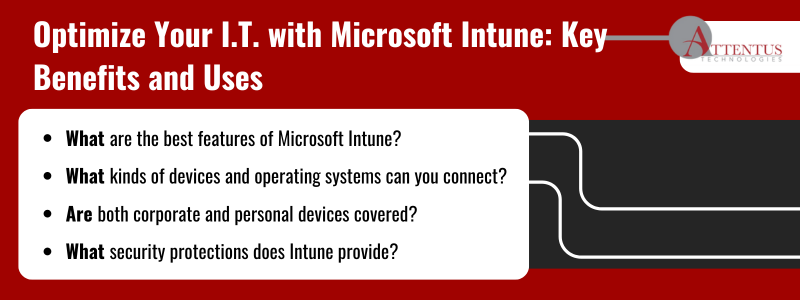Is Microsoft Intune the endpoint-management solution your organization needs? These useful features may help you decide.

More organizations are turning to Microsoft Intune for its flexibility and its cross-device compatibility. It is a versatile cloud-based endpoint management system that enables you to manage users and devices, including those owned by your organization and personal devices. Intune allows great connectivity and control for smartphones, tablets, and computers.
As Microsoft points out, Intune “manages user access to organizational resources and simplifies app and device management across your many devices, including mobile devices, desktop computers, and virtual endpoints.
The following are common use cases for Microsoft Intune to help you decide if it has the features you need for your business.
Centralized device management and control
A worthwhile endpoint-management system should be designed to effectively manage all the devices that can access your data and network. The breadth of endpoints can vary widely in modern computing environments, which often include bring-your-own-device policies. The solution should support various operating systems, including Android, iOS/iPadOS, Linux, macOS, and Windows devices.
Knowing where to start organizing all the different parts of a complete solution can be daunting. This is where Microsoft Intune features come in handy. They provide centralized device management and control through an easy-to-use web-based console.
Some businesses allow workers to use personal devices to access the company network and resources. You can require these personal devices to be enrolled in your organization’s device management services if you wish. Just as you can with company-owned devices, you can set rules, configure features, deploy policies, and do much more to ensure that personal technology is secure and has a level of access that you are comfortable with.
Application management and deployment
Microsoft Intune uses mobile device management (MDM) and mobile application management (MAM) to protect data at the app level. It lets administrators control how apps are used, making sure that sensitive data isn’t leaked or shared out of turn.
It supports different platforms, store apps, web apps, and line-of-business (LOB) apps. You can, for example, distribute apps from any private app store, enable Microsoft 365 apps, deploy Win32 apps, and much more.
You can set app protection policies and make configuration choices, such as mandating that all workers use apps’ latest and most secure versions on their company and personal devices. Policies can also be configured to control app access based on device compliance, location, and user risk level.
Secure corporate and personal devices
Whether they are corporate or personal devices, Microsoft Intune ensures that all the devices your company uses meet your set security requirements. The system features can protect both physical devices and data.
Intune provides a secure gateway allowing authorized workers to access organization data on their devices. The gateway is protected with security protocols and access controls that you set.
Administrators can ensure that end users can access the apps they need to do their jobs while maintaining security protocols.
Compliance and security
Intune allows administrators to enforce data protection through device configuration and compliance policies. They can manage how users interact with a company’s data, whether on managed or unmanaged devices, and block compromised devices from accessing data.
It also seamlessly integrates with Microsoft 365 and Microsoft Security, so an organization can safeguard its digital assets and comply with regulatory standards. At the same time, Intune automates and consolidates I.T. and security operations workflows, helping to reduce security costs and lower management overheads.
Remote work support
Microsoft Intune caters to the growing trend of establishing remote and hybrid workforces, ensuring access to corporate resources no matter what kind of device a user has or where they are located (as long as they have access to a secure internet connection).
A company can remotely manage all devices connecting to its network, so it can take actions such as remotely wiping a lost or stolen device, locking a device or pushing out app updates, including security patches.
The organization can set its policies for device usage, including restrictions on what apps can be installed.
Intune’s Remote Help feature helps ensure efficient and secure remote help desk connections. It allows only authorized staff to receive or provide support sessions. Key features include:
- Role-based access control
- Secure authentication requirements
- Support for non-enrolled devices
- Audit and monitoring
- Compliance and access control
Let us make the case to you for Microsoft Intune adoption
There are a lot of endpoint-management solutions on the market. These include:
- VMware AirWatch
- IBM MaaS360
- BlackBerry UEM
- AppBlade
With so many products to choose from, it’s sometimes difficult to distinguish gems from less precious stones. At Attentus Technologies, our experienced professionals can help you understand the merits and drawbacks of each approach.
We often recommend Microsoft Intune to clients because it can help your workers stay productive while remaining secure. It’s time-saving, security, and control features also help you realize a strong investment return.
Contact us today for a free technology assessment and consultation. You’ll discover why we are one of the leading I.T. services companies in the Pacific Northwest. We are committed to clearing up the mystery of I.T. and providing clear remedies to your business pain points.

